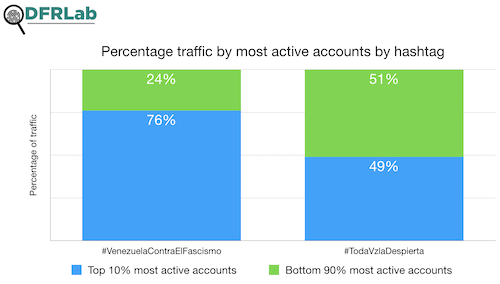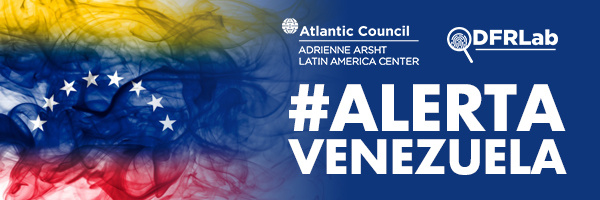#AlertaVenezuela is leading the way in identifying, exposing, and explaining disinformation within the context of one of the Western Hemisphere’s largest crises in recent history, where the fight for control of the information space will continue to pose a challenge for the region.
TOP STORY: Supporters of Maduro and Guaidó try to show strength in the streets and online
Inspired by recent events in Bolivia, supporters of both Juan Guaidó and Nicolás Maduro took to the streets in parallel, competing marches on Saturday, November 16. Guaidó called for the November 16 march as the first of a permanent series of protests to reach a definitive solution for the crisis. He said the aim was to “achieve what happened in Bolivia and that the Armed Forces and the police side with all Venezuelans.” In response, Maduro called on his supporters to head to the streets. Following Evo Morales removal in Bolivia, Maduro’s supporters added an additional cause into their protest and also marched in solidarity with the ousted Bolivian leader, who they claimed was the victim of a coup.
Competing displays of support also played out on Twitter. Supporters of the interim government of Venezuela used the hashtag #TodaVzlaDespierta (“AllVenezuelaAwakens”), which garnered 138,455 mentions that day alone. The most retweeted post was from Guaidó’s account and was also the post calling for the protest. Maduro supporters used #VenezuelaContraElFascismo (“VenezuelaAgainstFascism”), a hashtag pushed as the “hashtag of the day” by the Venezuelan Communications Ministry (archive). In the past, the DFRLab reported about this strategy used by the Maduro regime to amplify its presence on Twitter. The hashtag garnered 243,342 mentions, and the most retweeted post came from Maduro’s account.
Comparing a sample of 50,000 tweets posted on November 16 from both hashtags, there is indication that #TodaVzlaDespierta was more organic, while research showed signs of traffic manipulation in #VenezuelaContraElFascismo. The DFRLab defines traffic manipulation as the process whereby a small group of accounts attempt to amplify their presence online artificially by using bots, very high rates of posting, or a combination of tactics. Individual accounts posted the hashtag #TodaVzlaDespierta an average of 2.9 times, and the 10 percent most active accounts represented 49 percent of #TodaVzlaDespierta traffic. In comparison, accounts using the hashtag #VenezuelaContraElFascismo posted an average of 8.9 times, and the 10 percent most active accounts were responsible for 76 percent of the hashtag’s traffic, suggesting a group of accounts posted the hashtag repeatedly to make it seem more popular than it really was.

Finally, Maduro’s supporters were more successful in appropriating the hashtag #16Nov, which does not intrinsically denote bias. It was mentioned 318,898 times on November 16, and the most retweeted posts were from Telesur’s correspondent Marco Teruggi (archive) and Maduro (archive) himself, who tweeted that, on that day, Caracas’s streets would be “filled with joy from our peo
TALK OF THE COUNTRY
The article published by non-Venezuelan media about Venezuela that received the most engagement was “Bolivia expulsa a la delegación diplomática de Maduro y cierra la puerta a los médicos cubanos” (“Bolivia expels Maduro’s diplomats and closes the door to Cuban doctors”), published by the Spanish outlet El Mundo on November 16. The article was shared roughly 25,500 times on Facebook and garnered 141,500 interactions, including shares, comments, and reactions across all public and private posts on Facebook. In total, posts referencing the article received 136,700 engagements on Facebook and Twitter combined. The article was mainly amplified by Brazilian Facebook pages such as “Eu voto Bolsonaro” (“I vote Bolsonaro”) and “Chega de Corruptos” (“No more corrupt [people]”). The piece outlines the Bolivian interim government’s new foreign policy perspectives toward Venezuela and Cuba, governments previously supportive of ousted Bolivian President Evo Morales.
The article published by a Venezuelan outlet that received the most engagement on social media was “Con pitos, pancartas y banderas venezolanos toman la calle ante el llamado de #TodaVzlaDespierta” (“With whistles, banners, and flags, Venezuelans take to the streets before the call for #AllVenezuelaAwakens”) published by independent website La Patilla on November 16. The article garnered 51,300 interactions, including reactions, shares, and comments. In total, the piece was shared 10,600 times on Facebook and received 51,800 engagements on Facebook and Twitter combined. The piece describes the march in Caracas led by Guaidó.
On Facebook, the outlet PanAm Post shared the article “Bolivia: nuevo gobierno expulsa a 725 cubanos y a diplomáticos chavistas” (“Bolivia: new government expels 725 Cubans and ‘chavistas’ diplomats”) (archive). The post published on November 15 garnered 42,000 shares and 5,700 reactions, reaching 700 comments by November 19. The outlet’s post says: “#Bolivia. Four Venezuelans dressed as Bolivian police were arrested, and four Cubans with 13,000 dollars in a bag, accused of financing protests.”
HASHTAG OF THE WEEK
#PueblosDelMundoConEvo (“People of the World with Evo”)
With Morales’s resignation as President of Bolivia on November 10, 2019, different narratives have emerged on Twitter, including users supporting Morales and users claiming fraud in the October 20 elections.
Maduro’s Ministry of Communications boosted the hashtag #PueblosDelMundoConEvo, which aims to support Morales by denouncing what the Maduro regime, among other countries, has labeled “a coup.” Although the hashtag was first mentioned (archive) by the account @angelcarrillo13 on November 10, hours before Morales’s resignation, the official account of the Ministry, @Mippcivzla, posted (archive) the same hashtag on November 12. According to social media listening tool Sysomos, the hashtag garnered around 339,000 mentions.
@Mippcivzla’s first post using the hashtag received 1,000 retweets and more than 500 likes, but the most popular mention was posted (archive) by @Marco_Teruggi and reached more than 12,000 retweets. Maduro’s official account also amplified the post.
The DFRLab found – among the 46,178 users mentioning the hashtag – 1,790 accounts created between October 1 and November 13, especially after November 10, just after Morales resigned. In particular, 137 new accounts were created on November 11 and 132 on November 12.

The 50 most active users were responsible for nearly 8 percent of all hashtag traffic. The account @isnalypacheco, the most active user, published 984 posts mentioning the hashtag, while the accounts @dilme and @amelia74698445 were not far behind, posting 870 and 850, respectively. The proportion of retweets in the set of tweets was 95 percent and the number of posts per user were 6 tweets, which can indicate there was traffic manipulation.
OFFICIAL STATEMENTS
“Llega a suelo patrio el personal diplomático que se encontraba en el Estado Plurinacional de Bolivia y que hoy deben volver a Venezuela, como consecuencia del grotesco golpe de Estado contra el presidente Evo Morales y el pueblo boliviano.”
“[Venezuelan] Diplomatic staff who served in the Plurinational State of Bolivia arrived at home soil and they ought to return to Venezuela today, as a consequence of the outrageous coup against President Evo Morales and the Bolivian people.” – Maduro’s Ministry of Foreign Affairs, in a tweet posted (archive) on November 17, after Bolivia’s new government expels diplomatic staff from Venezuela.
“We urge the Venezuelan military to stand with the people of Venezuela, not a despot. The Venezuelan military should be a force of good! The power to change for the better is in your hands!” – U.S. Vice President Mike Pence on November 16 on Twitter (archive)
WHAT WE ARE READING
Are Venezuelans Leaning Right?, Caracas Chronicles
Published by local media outlet Caracas Chronicles on November 18, 2019, this article explains how the right-wing has not gained too much ground in Venezuela. Twenty years of “chavismo” have consolidated positions that move between redistributive paternalism and a center-left consensus, making this a complex terrain for the opposition in the country.
Dolarización en Venezuela: cómo Nicolás Maduro cambió de opinión sobre el dólar y su papel en la economía (“Dollarization in Venezuela: how Nicolás Maduro changed his opinión about the dollar and its role in the economy”), BBC
This article, published by the Spanish service of the BBC World Service, explains how Maduro went from strongly opposing the use of the dollar in Venezuela to saying, on November 17: “I don’t see it in a bad way […] the dollarization process; it can be useful for the restoration and deployment of the productive forces of the country and the functioning of the economy […] thank God it exists.” According to analysts, allowing the use of dollars and given more freedom to economic agents helps Maduro to relieve the pressure of the economic crisis in the country.
DFRLab and ACLatAm IN THE NEWS
Jason Marczak, director of the Atlantic Council’s Adrienne Arsht Latin America Center sat down with the New Atlanticist’s David A. Wemer to discuss the situation in Bolivia and the implications for the wider region. Bolivia reflects the deep polarization crisis in Latin America.
Subscribe to the #AlertaVenezuela newsletter
To receive future editions of the #AlertaVenezuela newsletter each week, sign up below!
